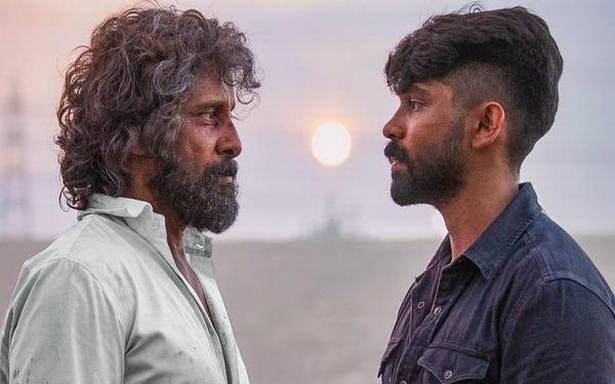Karthik Subbaraj attempts a meditation on morality and ideology within a crime saga that struggles to bear its own weight
By now, there are a few things we have come to expect in a Karthik Subbaraj film – sorry, ‘A Karthik Subbaraj padam’. A fairly popular old song that kind of fits the film’s narrative; a smattering of Rajinikanth movie references; a character named Michael; a cameo by Subbaraj’s father, Gajaraj… what else? Oh, yes, of course: the famous Karthik Subbaraj Twist™. These tropes and motifs can be viewed as signatures of an auteur or as repetitions that get a bit tiresome.
In Mahaan, you have mixed feelings about it. In fact, you have mixed feelings about the whole film as well.
It is by no means an ordinary film, because Subbaraj has attempted an epic. We have a sprawling drama, spanning decades. We notice the lives of three key characters crisscrossing each other; their fates, inevitably intertwined. We witness history repeating itself. If all this is not enough evidence of an epic, then there is Santhosh Narayanan’s trumpet-heavy background score that accentuates the drama.
The film opens with this Mohandas Gandhi quote: “Freedom is not worth having if it does not include the freedom to make mistakes.” What follows is the story of someone named Gandhi Mahaan (Vikram), who ends up making mistakes with a capital M.
Mahaan
- Director: Karthik Subbaraj
- Cast: Vikram, Dhruv Vikram, Simha, Vettai Muthukumar, Simran and more
- Storyline: A man is constrained by the ideology of an icon who is known for his struggle for freedom
- Runtime: 160 minutes
Gandhi’s grandfather and father are followers of, well, Gandhi. His father is so devoted to his ideology that he changes his son’s birthday from August 16 to August 15 on his birth certificate. Later, Gandhi marries Naachi (Simran), who is also a staunch Gandhian. She teaches her little son to shut his eyes if he sees a Hollywood movie poster because she believes these films contain violence and sex. Gandhi is not merely surrounded by Gandhians, he is stifled by them. Their expectation to emulate a man who is revered as a Mahatma burdens him. For, Gandhi’s inclination is to travel the path of pleasures — even if they are considered sinful.
Because of his father and wife, Gandhi, till he turns 40, lives — rather, forces himself to live — according to the Gandhian ways. But life takes a dramatic turn at 40 when he runs into his boyhood buddy Sathyavan (Simha), who has taken over his father’s alcohol business. Committing one sin after another, Gandhi becomes anti-Gandhi, and soon, he has a big life choice to make.
Vikram is fantastic as Gandhi Mahaan. He transitions effortlessly from a timid school teacher to a gun-wielding alcohol baron. His eyes convey the delightful menace when he finds out for the first time that he is capable of violence. They are equally effective in showing his helplessness as a man who has to make a tough choice.
The rest of the main cast do a fine job as well (Dhruv’s performance is, however, a little overpitched). Simha, especially, is impressive as Sathyavan. Subbaraj is in no hurry while fleshing out these characters. And, that is fine because you do not expect a gangster drama to travel at a breakneck pace.
One of the problems with Mahaan is that it does not quite hit you as it should. For instance, there is a point where Gandhi tells Sathyavan, “Oru vaazhkai, varalara vazhanum” [roughly translates to ‘We got one life, make history’]. It is an epic, hair-raising line on paper. But your hair does not rise when it is uttered on screen.
Another issue is the inconsistency in Gandhi’s emotional graph. There is a point where he is crestfallen, burdened by his own deeds. He looks like he has lost the will to live. But there is an abrupt liberation after which he returns to his audacious self.
In its last hour or so, you find the film trying to do too many things. We follow a father-son rivalry, a story of a man paying for his sins, a battle of two ideologies… and, of course, amidst all this, we get a twist as well (because this is a Karthik Subbaraj padam). It is admirable that Mahaan attempts to juggle all this. But after a point, it gets a bit excessive. And you wonder if the film should have listened to a line from its protagonist. “Everything in moderation. That’s the right way to be.”
Source: Read Full Article

